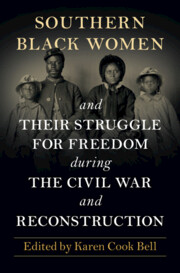Book contents
- Southern Black Women and Their Struggle for Freedom during the Civil War and Reconstruction
- Southern Black Women and Their Struggle for Freedom during the Civil War and Reconstruction
- Copyright page
- Dedication
- Contents
- Figures
- Tables
- Contributors
- Acknowledgments
- Introduction
- Part I Emancipation and Black Women’s Labor
- 1 “The Proceeds of My Own Labor”
- 2 “Please Attend to It for Me”
- 3 “I Had Time for Myself”
- Part II War, Gender Violence, and the Courts
- Part III Emancipation, the Black Family, and Education
- Notes
- Index
3 - “I Had Time for Myself”
Enslaved Women, Labor, and the Politics of Acquisition during the Civil War
from Part I - Emancipation and Black Women’s Labor
Published online by Cambridge University Press: 14 December 2023
- Southern Black Women and Their Struggle for Freedom during the Civil War and Reconstruction
- Southern Black Women and Their Struggle for Freedom during the Civil War and Reconstruction
- Copyright page
- Dedication
- Contents
- Figures
- Tables
- Contributors
- Acknowledgments
- Introduction
- Part I Emancipation and Black Women’s Labor
- 1 “The Proceeds of My Own Labor”
- 2 “Please Attend to It for Me”
- 3 “I Had Time for Myself”
- Part II War, Gender Violence, and the Courts
- Part III Emancipation, the Black Family, and Education
- Notes
- Index
Summary
Felicia Jamison analyzes Black women in the Georgia Low Country during the Civil War who used the personal time afforded them after laboring on rice plantations to acquire property and pass on goods to their children. Using the testimonies of women in the records of the Southern Claims Commission, Jamison demonstrates how Black women secured property before the war, lost their valuable property as Union soldiers traversed the region and commandeered their goods, and petitioned the Commission for restitution to provide for themselves and their families after the war. Using the “politics of acquisition” as a framework, Jamison argues that women in Liberty County, Georgia, used property to enhance their lives and secure their freedom. She demonstrates that the loss of personal goods such as clothing, livestock, and bushels of agricultural products severely hampered Black women and their families transition into freedom.
- Type
- Chapter
- Information
- Southern Black Women and Their Struggle for Freedom during the Civil War and Reconstruction , pp. 46 - 60Publisher: Cambridge University PressPrint publication year: 2023

